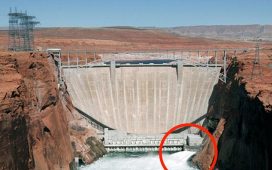Eco-friendly Britons switching from red meat to chicken are inadvertently contributing to the deforestation of the Amazon, Greenpeace claims
- Many Britons are moving from red meat to chicken for environmental reasons
- Greenpeace claims this is leading to an increase in factory farmed chickens
- These are fed on grain derived from soya beans imported from South America
- Greenpeace reveals UK food giants and supermarkets cannot guarantee this soya is deforestation-free
Meat-free Monday, Veganuary and ‘flexitarianism’ are all recent initiatives to help Britons cut down on meat intake, reduce emissions and help the environment.
And a central theme for many people cutting meat from their diet is to start with a baby step — switch red meat for chicken.
But this move is inadvertently fuelling deforestation of the Amazon rainforest, Greenpeace claims.
The environmental charity claims 1.4 million hectares of land — an area greater than Northern Ireland — is needed every year to produce enough grain to feed the UK’s factory farmed chickens.
This grain comes from South American soya farms and Greenpeace reveals UK food suppliers cannot guarantee their chicken grain comes from sustainable sources.
Scroll down for video

Pictured: Soy in a silo in Itacoatiara, Brazil that will be loaded on ships for export. Greenpeace claims 1.4 million hectares of land — an area greater than Northern Ireland — is needed every year to produce enough grain to feed the UK’s factory farmed chickens

Greenpeace went to 23 leading UK brands and quizzed them about their chicken sales and soya (pictured) usage
Greenpeace went to 23 leading UK brands and quizzed them about their chicken sales and soya usage.
None of the respondents were able to say with certainty the soya they used was deforestation-free.
McDonald’s, KFC, Burger King, Nando’s and Subway refused to disclose their meat sales or soya use altogether.
A direct correlation between chicken consumption in the UK and deforestation in South America is not proven, but Greenpeace claims there is a definite link.

A direct correlation between chicken consumption in the UK and deforestation in South America is not proven, but Greenpeace claims there is a definite link as the soya farms (pictured) are expanding to meet rising demand in the UK

Deforestation in the Amazon (pictured) for logging and agriculture is decimating the rainforest. Greenpeace claims much of the soya produced for the UK’s factory farmed animals is coming from deforested areas
Its latest report, titled Winging it: How the UK’s chicken habit is fuelling the climate & nature emergency, it reveals Argentina, Brazil and Paraguay are the primary sources of more than three million tonnes of soya imported to the UK every year to feed factory farm animals.
Greenpeace UK forest campaigner Chiara Vitali said: ‘Consumers cutting red meat are clearly trying to do the right thing for the right reasons.
‘But supermarkets and fast food restaurants are keeping them in the dark when it comes to the precious forests being destroyed to feed most of the chicken they sell.
‘What’s worse, instead of tackling the problem, they’re adding to it by pushing customers to buy more.
‘For too long the impact on our planet of growing crops for UK chicken feed have been overlooked.
‘A straight swap from beef to chicken effectively amounts to outsourcing emissions of our meat consumption from the UK to South America.
‘The simple truth is, we cannot continue to consume industrially-produced meat in the volumes we currently are. It’s why we’re calling on companies to set clear meat reduction targets and be transparent about where their animal feed comes from.
‘Animal feed for meat production is Europe’s largest contribution to deforestation.
‘Soya imports represent 47 per cent of Europe’s deforestation footprint, compared to 14 per cent for pasture expansion for livestock and 10 per cent for palm oil.’














